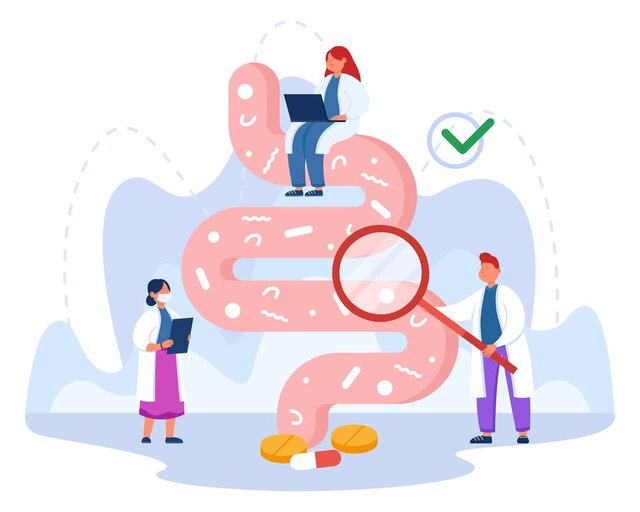Gut Feelings: Depression, Stress, and our Microbiome
Stressed? Humans possess a stress response for survival, and while our lives today look different from our ancestors’, stress is still ingrained in everyday life. Chronic stress is a constant state of being overwhelmed. Unfortunately, the chronic stress response can promote harmful psychological and physiological issues, such as depressive disorders. Depression is a widespread mental health disorder in the United States, characterized by a sad, depressed mood, loss of interest, changes in appetite, and fatigue, and caused by elevated levels of the stress-related hormone cortisol in the brain.
New research has shown that beyond our human biology, our own microbiome can contribute to and suffer from stress and depression. The microbiome is the genetic makeup of all of the microorganisms, or microbes, that inhabit our bodies including bacteria, mites, fungi, and viruses and the products they produce. More specifically, our digestive system, or gut, microbiome contains over 90% of the bacteria in our bodies, and communicates with the body via the newly discovered two-way microbiota-gut-brain axis. The gut-brain axis links the nervous system and brain functions with the digestive system, indicating that gut bacteria could play a role in depressive symptoms.
New research has shown that beyond our human biology, our own microbiome can contribute to and suffer from stress and depression. The microbiome is the genetic makeup of all of the microorganisms, or microbes, that inhabit our bodies including bacteria, mites, fungi, and viruses and the products they produce. More specifically, our digestive system, or gut, microbiome contains over 90% of the bacteria in our bodies, and communicates with the body via the newly discovered two-way microbiota-gut-brain axis. The gut-brain axis links the nervous system and brain functions with the digestive system, indicating that gut bacteria could play a role in depressive symptoms.
Image Source: freepik
The gut brain axis allows for communication in the form of signals released or relayed by microbes. For example, microbes directly communicate with gut-brain messenger neurons, which are specialized cells that tell the brain what to do. These neurons influence reward-related behaviors through brain circuits that regulate dopamine, an important hormone and messenger that plays a role in movement and happiness. This communication with neurons creates disruptions in gut-brain networking which may cause emotional disturbances like lack of interest and despair. In addition to direct contact with neurons, gut bacteria also have the power to create neurotransmitters, or chemical messengers. The increase in superfluous neurotransmitters can cause issues with the brain’s signaling ability and contribute to symptoms of depression.
A 2023 study showed that transferring the microbiota from a depressed donor into the gut of a non-depressed recipient causes depression-like symptoms in the recipient. This research showed that there are noticeably less bacteria and less variety of species in the gut bacteria of a person with depression compared to those without. It seems that stress could be the link between the gut changes and depressive symptoms. As noted earlier, stress is a symptom and a contributing factor to depression. Stress causes nutrients to gather in the lower gut which changes the microbiota composition and their growth. It also causes more movement through the gut which washes away certain species, causing a great amount of turnover. The gut microbiome is very sensitive to alterations in its makeup.
These insights shed light onto the complex issue of stress and depression. To combat depression, emerging approaches emphasize the pivotal role of gut health, including behavioral, dietary, and supplementary interventions that prioritize nurturing a balanced microbiome. While stress harms the gut, personally reducing stress could help restore health. For example, mindfulness and meditation can positively contribute to gut microbe differences. Prioritizing fiber and other nutrients that nourish the microbiome could also aid in maintaining the health of these microbes. Our bodies are not simply collections of organs, but instead collections of interacting organs and microorganisms.
A 2023 study showed that transferring the microbiota from a depressed donor into the gut of a non-depressed recipient causes depression-like symptoms in the recipient. This research showed that there are noticeably less bacteria and less variety of species in the gut bacteria of a person with depression compared to those without. It seems that stress could be the link between the gut changes and depressive symptoms. As noted earlier, stress is a symptom and a contributing factor to depression. Stress causes nutrients to gather in the lower gut which changes the microbiota composition and their growth. It also causes more movement through the gut which washes away certain species, causing a great amount of turnover. The gut microbiome is very sensitive to alterations in its makeup.
These insights shed light onto the complex issue of stress and depression. To combat depression, emerging approaches emphasize the pivotal role of gut health, including behavioral, dietary, and supplementary interventions that prioritize nurturing a balanced microbiome. While stress harms the gut, personally reducing stress could help restore health. For example, mindfulness and meditation can positively contribute to gut microbe differences. Prioritizing fiber and other nutrients that nourish the microbiome could also aid in maintaining the health of these microbes. Our bodies are not simply collections of organs, but instead collections of interacting organs and microorganisms.
Featured Image Source: pch.vector
RELATED ARTICLES
|
Vertical Divider
|
Vertical Divider
|
Vertical Divider
|






